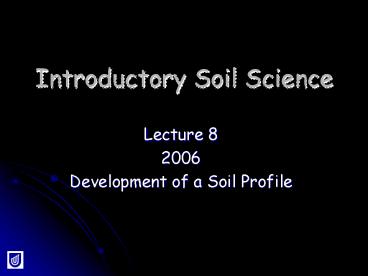Introductory Soil Science - PowerPoint PPT Presentation
1 / 30
Title:
Introductory Soil Science
Description:
called a catena. School of Natural & Built Environment. Introductory Soil Science ... Catena. Thin soils on steep slopes. Thicker soils near bottom of. slopes ... – PowerPoint PPT presentation
Number of Views:330
Avg rating:3.0/5.0
Title: Introductory Soil Science
1
Introductory Soil Science
- Lecture 8
- 2006
- Development of a Soil Profile
2
What is soil?
May depend on your view point!! Soil is a
mixture of mineral and organic matter which forms
a thin layer over the underlying bedrock. The
co-evolution of inorganic and organic components
takes place in a seral succession which begins
with exposure of bedrock and progresses towards a
relatively deep and mature soil.
3
What is soil?
- Soils are composed of
- an inorganic component
- an organic component
4
Soil components
- Inorganic Component
- Mineral materials
- they come from weathering of bedrock in situ and
material that is washed or blown in. - Organic Component
- this comes from material living in or on the soil
- these change from micro-organisms in bedrock to
higher plants at the end of the seral succession
5
What is soil?
Soils continue to develop over time and a
vertical differentiation called horizons results
6
SOIL FORMATION
- Read Charman Murphy pp 3 -12
7
Soil Formation
- Soil formation involves two parts
- Soil-forming factors
- Soil-forming processes
- We will discuss both-
- soil-forming factors today
- soil forming processes tomorrow
8
Soil forming Factors
9
Soil-forming Factors
- Factors determining soil type
- parent material
- climate
- topography
- time
10
Soil-forming factors
- Parent material
- bedrock materials
- composition determines soil properties
- Transported materials
- gravity colluvial
- water alluvial
- wind aeolian
- ice glacial
11
Soil-forming factors
- Bedrock is converted to the basic materials
(minerals) which form the inorganic component of
soils by the process of weathering
12
Soil Forming FactorsParent Material
- Parent material may be
- alluvium
- loess
- bedrock
13
Soil Forming FactorsParent Material
- Parent Material
- Rock Type
- Some rocks are more susceptible to weathering
and produce - deeper soils
- more fine particles
14
Particle sizes
- Sand 2.0 - 0.02 mm (2000 20µm)
- Silt 0.02 - 0.002 mm (20-2µm)
- Clay less than 0.002 mm (2 µm)
15
Soil Forming FactorsParent Material
- Parent material and particle size determine
- soil texture
- soil structure
- soil depth
16
Soil Forming Factors
- Factors determining soil type
- parent material
- climate
- topography
- time
17
Soil Forming FactorsClimate
- Climate
- Temperature and water have a profound effect on
weathering
18
Soil Forming FactorsClimate
Temperature
- - - - -
50 40 30 20
Clay content
l l l l
10 15 20 25
Ave. annual temperature
19
Soil Forming FactorsClimate
Water
- - - - -
50 40 30 20
Clay content
l l l l
10 20 30 40
Ave. annual rainfall (inches)
20
Soil Forming FactorsClimate
- Climate
- Hot wet climates produce fine textured, deep
soils - Climate also affects soil colour
21
Soil colour
- Soil colour results from staining of mineral
grains - Humic acid
- Black
- brown
22
Soil colour
- Soil colour results from staining of mineral
grains - Iron oxides
- Red,
- yellow or
- green
23
Soil colour
- Soil colour results from staining of mineral
grains - Salts
- White
24
Soil Types
- Climate and colour
- hot-wet climate removes organic material leaving
iron oxides - cool dry climate allows humus to build up
- arid climate are not humus producing and increase
the potential for salt build-up - water-logged soils cause iron oxide build-up
25
Soil Forming Factors
- Factors determining soil type
- parent material
- climate
- topography
- time
26
Soil Forming FactorsTopography
- Topography-slope affects soil depth
- steep slopes have thin soils
- colour texture change down slope
- results in a series of related but different
soils from top to bottom - called a catena
27
Soil Forming FactorsTopography
Catena
Thin soils on steep slopes
Thicker soils near bottom of slopes
28
Soil Forming Factors
- Factors determining soil type
- parent material
- climate
- topography
- time
29
Soil Forming FactorsTime
- Time
- the development of a soil over time is called a
seral succession - mature soils take 100s to 1000s of years to form
- changes in conditions during the long periods of
soil development result in polygenetic soils
30
Soil types
- Organic matter also affects soil development but
we will deal with this later.































